- Title: Sexual Ethics and the New Testament
- Subtitle: Behavior and Belief
- Page Count: 216
- Available Formats: Trade-paper (9780824518011)
- Edition: Trade Paper
- Original language: English
- Retail US: Trade-paper (30.95)
- Retail Canada: Trade-paper (37.95)
- Retail Canada: 37.95


